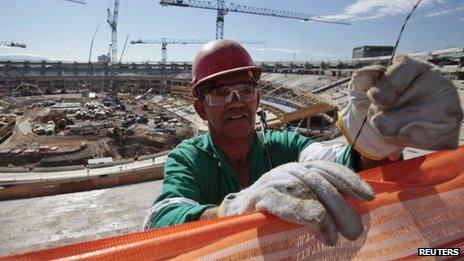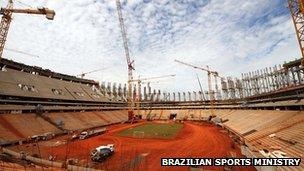Brazil 2014: Doubts over nation's World Cup legacy
- Published

The 2014 World Cup final will be at Rio de Janeiro's Maracana Stadium
With exactly two years to go until Brazil hosts the next Fifa World Cup tournament, there is still uncertainty over whether everything will be ready in time.
According to the latest government figures, nearly 60% of all construction and renovation work on stadiums, airports and transport infrastructure is either "finished" or "under way".
However, work in other areas leaves much to be desired.
In total, federal and local government have together pledged $13bn (£8.3bn) worth of investments.
The preparations have been hit by setbacks, including the drawn-out resignation of Ricardo Teixeira as head of the local World Cup organising committee.
There has also been an uncomfortable spat between Fifa, the competition's governing body, and the Brazilian government over tournament rules, such as the sale of alcoholic drinks in stadiums and cut-price tickets for students and pensioners.
Despite this, the government insists that nearly 85% of the promised work will be ready by the end of 2013.
For many Brazilians the World Cup was a once-in-a-lifetime chance to tackle inadequacies in roads and airports that previous governments promised but failed to address.
The potential legacy now seems less promising.
Mixed messages
Cities Minister Aguinaldo Ribeiro has said that the government might drop some of the works unlikely to be ready from its original proposals.

The Mane Garrincha stadium in Brasilia will host the opening of the Confederations Cup in 2013
However, in a somewhat mixed message, Sports Minister Aldo Rebelo told the BBC the government was still working on the assumption that everything would be delivered.
"Where this won't be possible, we will definitely find a solution. Some of the works are not meant to be built specifically for the World Cup. Instead they had already been already planned as part of the country's investments in infrastructure," he said.
Fifa officials also seem philosophical about what can and cannot be done.
Fifa secretary general Jerome Valcke, speaking after meeting Mr Rebelo last month, said some projects could be finished after the event, as happened in South Africa.
"We at least need 100% of the stadiums, that is for sure," said Mr Valcke.
"We do need 100% of the infrastructure to get from the airport to the city and the city to the stadium... But we don't need an entirely new country for 2014 - that's impossible."
Mr Valcke may have got to the heart of what will be a key issue as the tournament draws nearer.
Although four of the stadiums are half-finished and the other eight are even less advanced, the government has guaranteed six venues will be ready for the Confederations Cup in June 2013.
But the main concern lies elsewhere.
"The biggest challenges are the airports and the transport infrastructure, as too little has been done until now," said Professor Paulo Rezende, head of the department of infrastructure and logistics at Fundacao Dom Cabral, a leading business school.
Temporary terminals
According to a recent report published by Brazil's audit office (TCU), just 4% of the $3.1bn of funding set aside for transport has been invested to date.

Victory in 2014 would erase painful memories of the last time Brazil hosted the tournament
The current situation in Brazil's airports, which are already bursting at the seams, is the biggest concern.
In 2011, 179 million passengers travelled through the 67 airports run by the government aviation body, Infraero - 108 million more than in 2003.
The result has been queues, delays, poor services and overcrowding: at Sao Paulo's international airport, it can take up to two hours to pass through immigration.
Carlos Campos, a senior researcher at the Institute for Applied Economic Research (Ipea) in Brazil, says most of the scheduled improvements will not be ready for the World Cup.
Eight airports where improvements are planned in the terminals are still in the initial phase, he says.
"That means that the government might have to build temporary structures to meet the additional demand."
Final dream
Costs will rise as the government spends more to meet the deadline requirements, says Prof Rezende.
"We will end up paying a high price for hosting the World Cup."
For most Brazilians much of this angst may be eased if the country wins the competition.
Victory in 2014 would go far in wiping out the pain of defeat in the 1950 final, when the nation last staged the tournament.
But on the national side's present form - they are currently ranked fifth in the world - that, too, can not be relied upon.
- Published6 June 2012
- Published2 December 2011
- Published30 October 2011